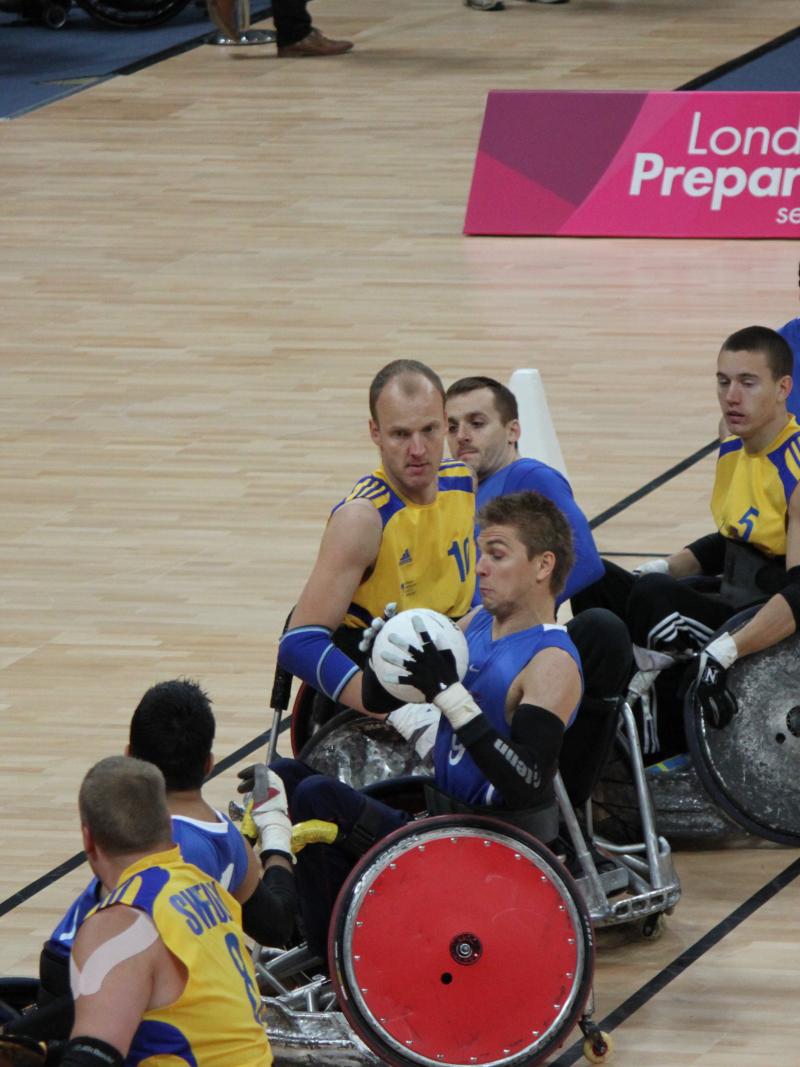Australia Win Gold at Wheelchair Rugby Test Event
Australia took gold, Great Britain silver and Canada bronze in a fast-paced tournament that gave players a taste of what is to come at the London 2012 Paralympic Games. 19 Apr 2012
Australia's Chris Bond, the team's second highest scorer, cannot be overlooked by his opponents.
“That was a very hard lesson. I'm disappointed with the scoreline, but respect to Australia, and to Ryley. He's the best player in the world.”
Australia won the Wheelchair Rugby Test event at the Basketball Arena on London's Olympic Park on Thursday (19 April). They blasted Great Britain with a 71-48 win in the final.
Canada won the bronze-medal match against Sweden 50-48, only taking the lead in the final period.
In the gold-medal match Australia's Ryley Batt and Chris Bond proved to be an unstoppable double-act, which Great Britain could not match.
“We wanted to show GB what we could do, and the score reflects that, but GB didn't play their best game,” said Batt.
“They're better than that, and I know come London, they'll be a better team,” added the 22-year-old, who scored 30 of Australia's 71 goals.
His teammate Chris Bond, also a 3.5-pointer, scored 22 goals, showing that the Bond-Batt combination will be a force to be reckoned with at the Paralympics. Batt hopes the team line-up will be strong enough to beat world number one team, USA.
“I hope the USA are scared [of playing against us],” Batt said. “I know I would be. It's definitely possible for us to win gold.”
Batt spent much of the game, dodging and dancing around Great Britain's top-scorer Aaron Phipps. Phipps, a former wheelchair marathon racer, showed he had the speed to outmanoeuvre Batt, but at times the Australian's hunger for the ball proved unstoppable.
“That was a very hard lesson,” said Phipps. “I'm disappointed with the scoreline, but respect to Australia, and to Ryley. He's the best player in the world.”
“We can still take loads of positives from the game and the tournament as a whole. Beating Canada yesterday was a massive result for us. We'll be watching the videos [of the games] at our training camps and looking where we can improve.”
Sweden led the bronze-medal match until the final quarter, promising to reverse the fortunes of the final pool game match in which Canada won by a 13-point margin.
But when top-player Tomas Hjert was taken off in the final quarter, Canada managed to break through Sweden's defence lines to win bronze, 50-48.
“I think our result proves it takes a whole team to win a game,” said Canada's Mike Whitehead, a 3-point player, who scored 4 goals during the game.
“We pride ourselves on always working together, and that is exactly what we did today.”
Unlike Australia and Great Britain, where one or two players dominated the scoreline, the goals were much more evenly distributed amongst the Canadian players.
Though Sweden lost all of its matches during the tournament, head coach Benoit Labrecque, who used to Coach Canada, was satisfied with how the players played.
“I was pleased with the game because we tried new line-ups that worked,” said Labrecque.
“We need to go back to basics and create space on the court,” he added.
Earlier in the day, in the final pool game, Great Britain also played Australia, and Canada played Sweden.
As Great Britain and Australia had won two pool games a-piece, they were already headed to the final, regardless of the result. So both teams used the morning match as an opportunity to give newer players a chance to show off their skills. Batt did not go on court at all and Phipps only went on briefly.
In that game, Great Britain won against Australia 52-51 after the match went into overtime, and Canada beat Sweden 61-48.

 Facebook
Facebook
 Instagram
Instagram
 Twitter
Twitter
 Youtube
Youtube
 TikTok
TikTok
 Newsletter Subscribe
Newsletter Subscribe


